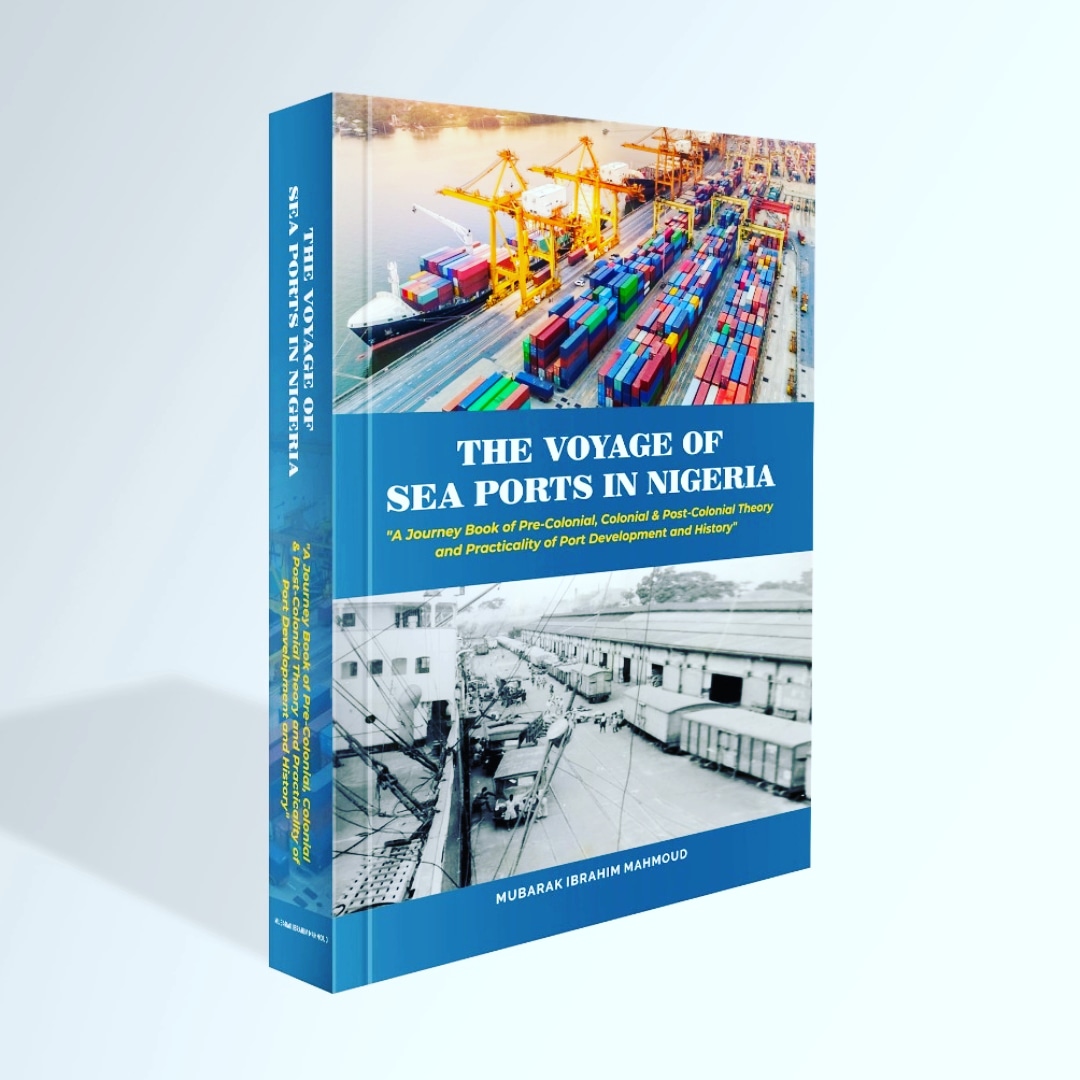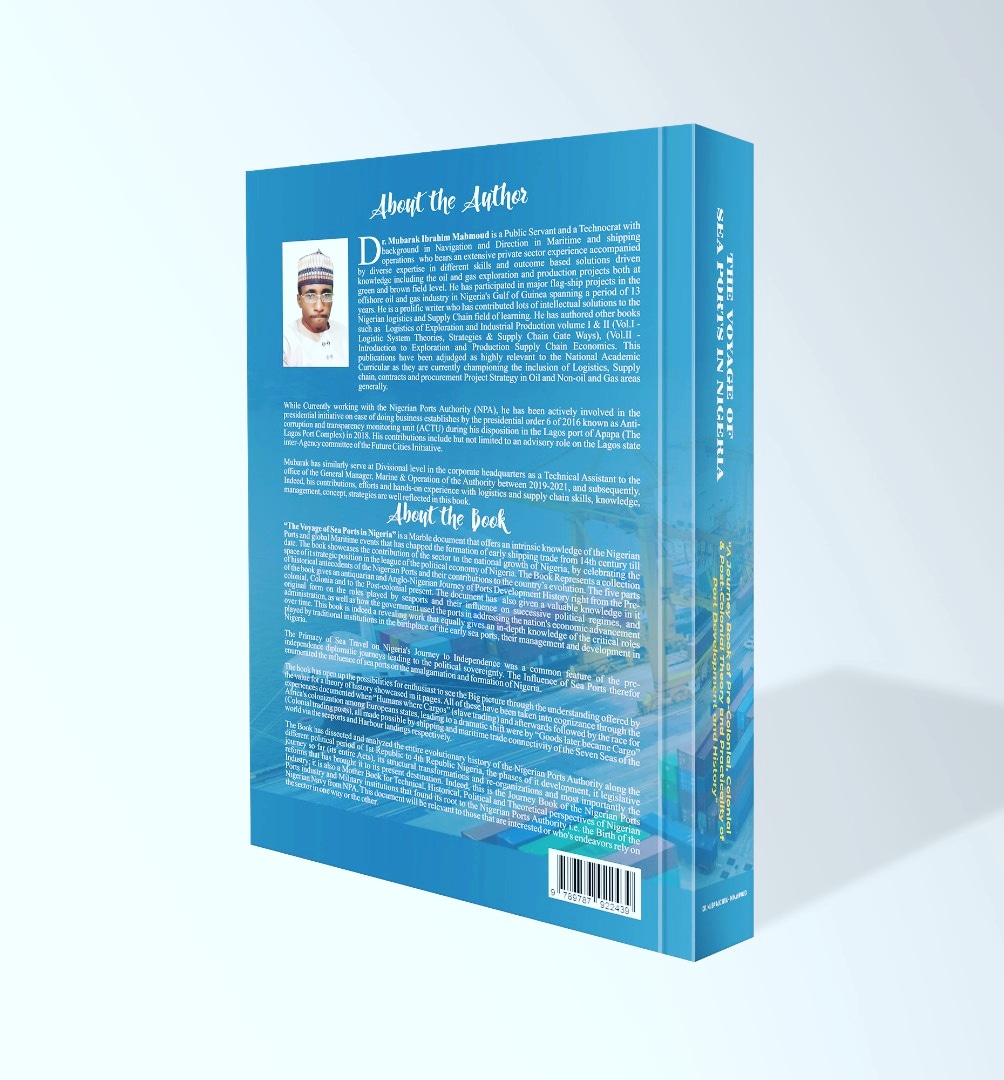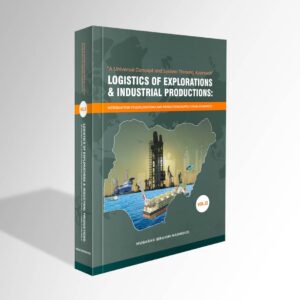This book presents the Nigerian Ports Authority (NPA) to the global audience; it is the mother book for Port professionals and enthusiast who are interested in learning Port Management studies and other port related specialization in institutions across all strata of education system in Nigeria and around the world. The Nigerian Ports Authority is one of the foremost Government Agencies
of the Nigerian Government first established in 1906 then known as the “The Nigerian Marine” prior to Nigeria’s amalgamation in 1914. Hence, the Organization’s history predates that of Nigeria’s independence. The Ports were the first points of contact that helped established the foundation upon which the initial premise for the creation of British colonial trading posts in Nigeria, which took place subsequent to the abolition of the notorious slave trade of the 16th and 17th century civilization. Therefore, shipping activities and the race for political and economic supremacy among Europeans was responsible for the unrelenting convergence of European invaders in the shore lines of Africa’s Coasts including Nigeria. The Book “THE VOYAGE OF SEA PORTS IN NIGERIA” started with the preamble of how Meridian crossings of the sun, the moon and the stars were used by early Navigator to record time: solar, lunar and sidereal days respectively in order to influence the advancement in Maritime Navigation during the 14th Century which contributed in changing the pattern of early shipping trade and the narratives behind the journey of the entire shipping and ports evolution history from a global angle right down to the local experience of Nigeria. All of these are offered in a technical, theoretical, political, and in their original perspectives using the Nigerian understanding, from the Pre-colonial, Colonial and Post-colonial periods through the application of theory and practicality of port development history in order to deliver knowledge of port studies in an approximately five
hundred pages of work, presented in five (5) Parts and 29 Chapters.
The Book has succeeded in identifying all the global and local historic events and episodes that have summed up to form what is today the Nigerian Ports industry. Notable actors in the Southern Port Cities of Nigeria are the early Kings of the coastal settlement in what is today Southern Nigeria as enumerated below;
1. King Eyo – Old Calabar (1853)
2. Charles Horsfall – the chief monarch of Brass River (1859)
3. King Jaja of Opobo – Bonny Island (1860)
4. King Dappa Pepple – Bonny Town (1860)
5. King Nana Olomu – Warri (1860)
6. Oba Dosunmu – Lagos (1861)
7. King Amacree of New Calabar – (1870)
8. King Fibia of Okrika – (1870)
The Aggregation of these events indicate that episodes which makes up the complete history of port development in Nigeria extends beyond the coastal settlements which harbour’s the Nigerian sea ports today, but rather extend right up to the interior ancient city-states of what is Northern Nigeria in present time. Evidently, the text literature succeeded in capturing the unique contributions recorded from the actions of some outstanding Monarchs of the city-states as their contributions turned out to be quite significant and in some cases audacious in shaping port development history in their respective rights. These city-states were and are still till date notable Emirate in the Sokoto Caliphate of what is in today Northern Nigeria, all of which took place during the peak and decline of colonization in Nigeria, i.e.;
1. Sultanate of Sokoto (9th Sultan Umaru Bin Ali of 1881 -1891) R. Ta’alla Anhum
2. Sultanate of Sokoto (15th Sultan Hassan Dan Muazu of 1931-1938) R. Ta’alla Anhum
3. Gwandu Emirate (10th Umar Bakatara 1887-1891) Radiyallahu Ta’alla Anhum.
4. Gwandu Emirate (16th Emir of Gwandu Shehu Usman of 1923-1937) R. Ta’alla Anhum,
5. Kano Emirate (7th Emir Aliyu Babba Maje-Karofi of 1894-1903) R. Ta’alla Anhum,
6. Kano Emirate (8th Emir Muhammadu Abbas A. Babba Maje-K of 1903-1919) R.T.A
7. Zazzau Emirate (14th Emir Aliyu Dan Sidi Bamalli of 1903) R. Ta’alla Anhum,
8. Zazzau Emirate (19th Emir Amb. Mallam Ahmad Nuhu Bamalli of 2020 till date) R.T. A
9. Ilorin Emirate (1
st Emir Abdulsalam Mai Tuta (r.1823 – 1835) R. Ta’alla Anhum
10. Ilorin Emirate (2
nd Emir Shitta Dan Salihu Ibn-Janta (r.1835 – 1868) R. Ta’alla Anhum
11. Ilorin Emirate (4th Emir Shita Aliyu Dan Shittu) (r.1868 – 1891) R. Ta’alla Anhum
12. Ilorin Emirate (5
th Emir Momo Dan Zubairu (r. 1891 – 1896) R. Ta’alla Anhum
13. Ilorin Emirate (6
th Emir Suleimanu Dan Aliyu (r. 1896 – 1914) R. Ta’alla Anhum
14. Bida Emirate (2
nd & 5th Emir Masaba dan Malam Dendo of (1841-1847 1st term/1859 – 1873
2
nd Term) Radiyallahu Ta’alla Anhum.
Other notable presentations in the book includes the roles played by sea ports in shaping how successive political regimes, administrations and governments of Nigeria utilized the ports in addressing economic development strategies, starting from the first (1st, 2nd, 3rd, & 4th ) Republic Nigeria right up to the fourth Republic Nigeria. The role and contributions of these heads of
governments within these period of the republics and that of their Ministers of Transportation on one hand and their corresponding Past Managing Directors of Nigerian Ports Authority on the other hand, were all documented. “The Voyage of Sea Ports in Nigeria” is a master piece that have indeed compiled some of the most important accounts in the political and evolutionary history of Nigeria from a general case (deductively) and subsequently to a particular case (inductively) between the 14th Century and present 21st Century.
From the Global Angle, it is worthy and interesting to note that outcomes of event in maritime shipping trade was responsible for the rise of Western Capitalism in Nigeria, but was not justified as an economic model in the beginning of the mercantile trade until the Institution of the Limited Liability Company (or Corporation in 1800s) in the Great Britain. Literarily, early traces of Capitalism were noticed in Nigeria during the early post slave trade shipping era, but became apparent at the peak colonization. This book therefore, has considered the direct and adjourning episodes that influenced enormous activities of the early 15th Century British trade in Escravos river, Calabar, Bonny, Brass and Lagos, Sokoto & Kebbi via river Niger, Niger, Kwara (Ilorin) Zaria, Kano, old Kaduna, Old Gongola (Adamawa & Taraba etc) and Borno via river Benue, and Kogi till date. As these events, especially those that occupies a preeminent position in the place of human history and Nigeria’s economic history, which helps reflect the historic narrative and
the possibilities to see the Big picture through the understanding offered by the value for a theory of history showcased in it pages, all of these have been taken into cognizance through the experiences documented when “Humans where Cargos” (slave trading) and afterwards followed by the race for Africa’s colonization among Europeans states, leading to a dramatic shift were by “Goods later became Cargo” (Colonization), all made possible by shipping and maritime trade connectivity of the Seven Seas of the world via the seaports and Harbour landings respectively.
Other interesting events worthy to be mentioned was the tenacity and diplomacy that was exhibited by colonial expedition of 1887. One of the steamer companies who owns fleet of steamer ships were reported to have for security reasons armed, the trading steamers that pushed through the creeks and rivers to hinterland oil markets were armed as a general precaution for example, the Miller Brothers’ steamer, Sultan of Socotoo, was well armed with iron screens for protection of those on board, this steamer enjoyed Emirs of Gwandu Umar Bakatara and Emir Massaba Dan Mallan Dendo of Bida protection along the upper river Niger. It was said that the
company used this boat to “fight their way through the Delta opposition” establish factories on the Qua Iboe River between Opobo and Old Calabar. There is no doubt that Port history in Nigeria cannot be completely told without the colonial railway development in the hinterlands to which the 14th Emir of Zazzau’s contribution was a remarkable experience, and where Kano and neighboring states was the major source for the colonial mercantilization of agricultural commodities, Ilorin on the other hand was a Colonial Trade Route between the North and Southwestern ports, whose defense against the formal hostility launched by it neighboring settlements of (Oyo’s) and it continued insistence at different occasion to launch raids on the Ilorins, these actions were found by the British to constituting major threats to its colonial trade interests. Because the creation of these trading posts was the reason for colonial invasion, and the need to establish the colonial rail communication between the North & South became imperative before laws can be made and transportation of commodities to the sea ports could take place under a legitimate premise to serve the colonial rail development goal which in the first instance was indeed the main take home. These occurrences, were validated by the reasons offered, that the rail lines were indeed identified as the enablers that will aid colonial communications between the Colonies and Protectorate of Northern and Southern Nigeria by Fredrick Lugard in 1913, hence linking the rail lines was a means for colonial legislations in Nigeria after its amalgamation.
The Book has dissected and analyzed the entire evolutionary history of the Nigerian Ports Authority, the phases of it development, it legislative journey so far (its entire Acts), it structural transformations and re-organizations and most importantly the reforms that has brought it to its present destination. Indeed, this is the Journey Book of the Nigerian Ports Industry; it is also the Mother Book for Technical, Historical, Political and Theoretical perspectives of Nigerian Ports industry and Elite institutions that finds their root to the Nigerian Ports Authority i.e. the Birth of the Nigerian Navy from NPA, as well as those that are interested or rely on the sector in
one way or the other. Thus can be referenced across all strata of education and policy management stakeholders both in government and the private sector. Today, with the introduction of this book, the entire journey from 14th century till date of shipping and port development history in Nigeria has been simplifies. It is interesting to know that the book succeeded in documenting interesting episodes that led to Nigeria’s formation through the port development history including the critical role of Traditional Institutions both from the North and Southern Nigeria in laying the foundation of these historic developments in Nigeria. The Book is designed to celebrate the exemplary history of Maritime Trade and Ports in Nigeria’s national survival. Readers should expect to find Historic, theoretical, technical, political, social, economic and scientific information’s presented in their original formats. Reader will comprehend intrinsic information’s such as; Shipping when Humans were Cargo, Shipping when commodities became Cargo, the Rise of Capitalism in Nigeria, the Institution of limited liability company, mercantilization of agriculture in Nigeria, the Birth of the Nigerian Navy, the role of traditional institution in ports development and shipping trade in Nigeria, political actors that shapes port
development history in 1st , 2nd , 3rd , and 4th Republic Nigeria, the constitutional journey of Nigeria, the Legislative journey of the Nigerian Ports Authority, the commercialization of Nigerian Ports Authority, the reversal of NPA to a tool port Authority, Port reforms in Nigeria, Port tariff structure Pre-concession, Port tariff structure Post-concession, Anatomy of NPA’s corporate structure, Chronology of NPA’s past administrations till-date. Indeed, this book is indeed the Journey book of Nigerian Ports Industry therefore is a book of the time and is hereby recommended to all.
NB: R.T.A – Stand for: Radiyallahu Ta’alla Anhum,
NB: R. Ta’alla Anhum – Stand for: Radiyallahu Ta’alla Anhum,
NB: R.T. Anhum – Stand for: Radiyallahu Ta’alla Anhum,
Dr. MUBARAK IBRAHIM MAHMOUD.
JULY 2022





Reviews
There are no reviews yet.